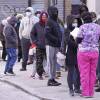Public officials across the globe are tracking new outbreaks of monkeypox, which has made its way to Massachusetts. Officials say the threat to the general public, including here in Massachusetts, is low. Here's what you need to know about the virus.
What is monkeypox?
Monkeypox is a rare virus first discovered in 1958 that starts out like a flu and then progresses with swollen lymph nodes and a rash that usually starts on the face and spreads to the body. The symptoms are similar to smallpox and include fever, headache, muscle aches and exhaustion. Health experts say symptoms can last up to four weeks. According to the World Health Organization, recent outbreaks have had a morbidity rate of 3–6%.
More Local News
Monkeypox spreads through close human-to-human contact of bodily fluids or skin lesions, or contact with materials like bedding that have been used by an infected person. The majority of past cases have originated in Africa, with some travel-linked cases in the U.S. and Europe, including in Texas and Maryland in 2021.
There is no treatment, but “most patients with monkeypox will recover on their own within two to four weeks of their first symptoms,” said Jennifer McQuiston, deputy director of the CDC’s Division of High Consequence Pathogens and Pathology, at a CDC conference Monday. The strain currently spreading is a more mild version of monkeypox.
Where has monkeypox been found?
So far, there has been one confirmed case of monkeypox in the United States, in a Massachusetts man who recently traveled to Canada and is being cared for at Massachusetts General Hospital. The CDC said in a press conference Monday that there are four additional suspected cases in the U.S. — in New York, Florida and Utah — that are waiting to be confirmed. The World Health Organization says it is also tracking a cluster of cases in several European countries that don’t usually see monkeypox.
The Massachusetts Department of Public Health is monitoring more than 200 people who came into contact with the man confirmed to have monkeypox, “but the vast majority of [the contacts] are health care workers,” according to McQuiston. The CDC says the threat to the general public is still low, but “it’s likely that there are going to be additional cases reported in the U.S.,” McQuiston said.
Who is at most risk for monkeypox?
Unlike coronavirus, monkeypox does not spread easily. “The primary people at risk are going to be those who spend close physical contact time with someone who already has monkeypox,” said McQuiston, like family members or healthcare workers.
The Massachusetts Department of Public Health notes that this outbreak is spreading mostly among men who have sex with other men. However, the CDC stresses that “anyone can develop and spread monkeypox infection” and that currently “many of those affected in the current global outbreak identify as gay and bisexual men,” said CDC epidemiologist John Brooks in a press conference Monday.
Brooks encouraged people in the LGBT community to monitor themselves for symptoms. “If you have a new or unexplained rash or other symptoms, see your doctor or seek medical attention and evaluation,” he said, noting that anyone without health insurance can visit a sexual health clinic.
How is the outbreak being addressed? What role could vaccines play?
On Monday, the CDC announced that it had successfully sequenced the virus found in the Massachusetts patient.
"This process previously took up to two weeks, but we were able to get it posted within two days because we feel like this kind of public sharing of early sequence data is going to be important for all countries to do so that we can all better understand how the virus is spreading across the globe," McQuiston said.
According to the CDC, the smallpox and monkeypox viruses are closely related, so vaccines that have been developed and stockpiled for smallpox can be used to stop this spread.
Moderna, the Cambridge-based company that successfully developed the COVID-19 vaccine, announced Monday that it was in the beginning stages of investigating monkeypox vaccines.
Underscoring this commitment, and as #monkeypox is of global public health importance as identified by the @WHO, we are investigating potential monkeypox vaccines at a preclinical level. pic.twitter.com/4VfLrxybNn
— Moderna (@moderna_tx) May 23, 2022








